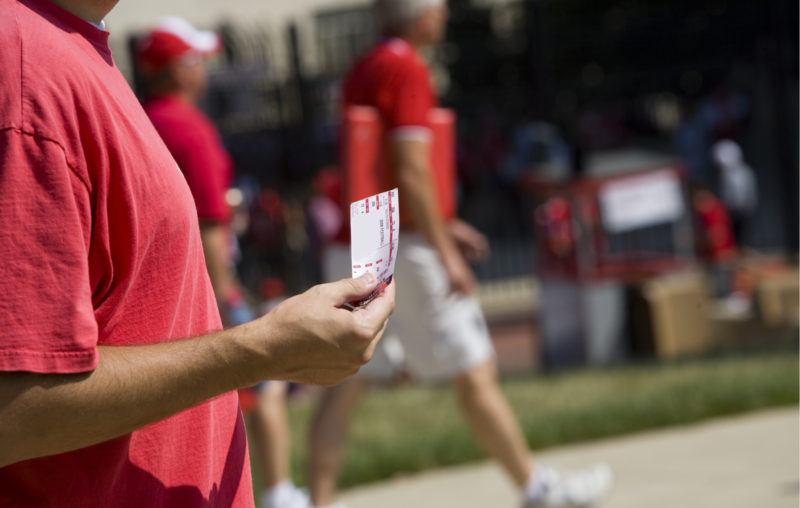How Much Should You Sell Your Vote For This November?

One of the few nice things about the hyper-partisanship currently enveloping the American political scene is that it sometimes opens up avenues of liberty long considered impossible. Like selling your vote to the highest bidder.
Until the late nineteenth century, it was as American as apple pie for voters to favor one side or another based on sundry types of side payments, from punch parties to lease extensions. Cash undoubtedly traded hands too, “under the table” as Americans used to say.
Votes could be exchanged because voting was not then secret so bargains could be enforced, if only extra-legally. Early Americans voted viva voce, or by voice, or by simple paper ballot, pieces of paper typically provided by slates of candidates or their minions.
The so-called Australian or secret ballot introduced in the U.S. in the late nineteenth-century made it extremely difficult to trade votes because a voter could renege by receiving a favor from X while secretly voting for Y. Progressives considered this an improvement because it removed the direct link between money and electoral outcomes but it ultimately benefited all politicians at the expense of voters because it changed the game to one of trading mere policy promises for votes.
Politicians sometimes delivered “pork” for their constituents but more often they delivered excuses about how they were blocked by the bad guys in the other party. Many voters preferred the good old days when at least they received something tangible in return for their support. Soon, though, Americans forgot about vote selling and increasingly wondered why they should bother to vote at all, particularly when shown irrefutable mathematical proof that voting to sway elections was, in almost all instances, irrational.
Absentee balloting was an effort to keep up voter participation by allowing those with some excuse, like illness or travel, to vote by mail. For a long time, the number of such ballots were too few to matter, so it was in no one’s interest to purchase them.
Today, however, universal vote-by-mail and “no excuse” absentee balloting is big enough to sway elections. According to Brookings, nearly one quarter of the ballots cast in 2016 were by mail.
While it remains technically illegal to sell one’s vote, adults generally realize that just because something is illegal does not mean that it won’t happen, especially when money is involved. Brookings insists that voting-by-mail provides no partisan advantage and that sufficient safeguards are in place to prevent fraud, by which it means partisans concocting or destroying votes. But past experience, as any investor knows, is no guarantee of future performance. The thought that a market in votes could develop does not seem to have occurred to its brilliant scholars.
But just imagine a knock at the door. A masked individual with kind eyes and non-threatening body language beseeches a few moments of your time to discuss “the crisis facing this country.” You demur, citing lack of time or interest. Out comes a $20 bill and the hint that there may be more. You stash the cash, invite the person in, and soon admit that you think both major party candidates are bums. Out comes a green portrait of Benjamin Franklin and a request that you grab your vote-by-mail form. “Just sign here,” says the masked stranger, who then checks a few boxes and seals the envelope. “Now sign here,” pointing to the envelope flap, “and I’ll take care of the rest.” (This is the mail voting procedure outlined by Brookings.) The stranger leaves, conveniently “forgetting” the money brandished earlier on your kitchen table.
But is $100 enough? You might find out that your neighbor held out for $1,000 or $10,000. It is not like you can complain to the government for getting ripped off. Even if you did, will a jury believe the word of a vote seller? Could you even identify a masked individual? Could you prove beyond a reasonable doubt that the stranger did not honestly forget the money on your table? Or maybe the Franklin, like the Jackson, was a payment for your “time” rather than your “vote”?
It would be most efficient, in terms of voter surplus, if government simply made it legal to sell one’s vote so swing voters in “purple” states or districts could hold an auction and be sure of receiving the equilibrium price. (Presumably, votes in “true blue” or “red or dead” districts would remain nearly valueless, creating incentives for lawmakers to engage in yet more gerrymandering.) It might also create positive externalities for almost everyone by diverting campaign spending away from those annoying advertisements toward vote buying.
Overall, though, vote buying could prove disastrous for governance by turning our government into the equivalent of an 18th century French “tax farm.” Under that notorious system, French businesses paid the King a lump sum for the right to collect (“farm” or “harvest”) certain taxes in specified areas for a given length of time. Eager to recoup their investment and turn a profit, the tax farmers tended to be quite brutally exploitative.
U.S. politicians arguably face similar incentives as they try to turn a political profit on their campaign expenditures but vote exchange could well exacerbate matters. Moreover, without a legal market many resources will be lost in transaction costs, like paying and monitoring the masked stranger knock, knock, knocking on your door.
Ultimately, of course, each individual has to decide if, when, where, how, and for how much they sell their vote this fall. All that can be said for certain is that in most states it is now quite possible to do so and that the masked stranger does not even have to work for a political party or candidate. In fact, vote buying solves problems for donors by ensuring maximum effect for each dollar spent and by sidestepping campaign finance laws.
Quite an interesting experiment in self-governance, this country of ours!










